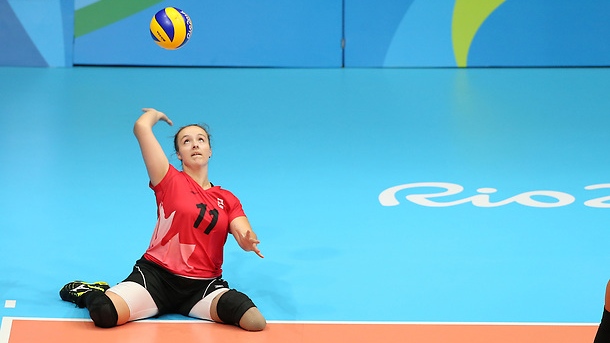After a strong performance in Tokyo, Team Canada’s sitting volleyball team is targeting the 2024 Paralympic Games in Paris.
Based in Edmonton, the Paralympians are training for their first qualifying tournament next month in Bosnia.
Adapted play offers people with physical disabilities the opportunity to play volleyball. While the nets are lower and the court is smaller, the pace of the game is actually faster than standing volleyball.
“Sitting volleyball is a really promising parasport,” said Heidi Peters, a two-time Paralympian who plays as a forward.
Peters has been with the team since 2013, including as a member of the 2015 team that made program history by qualifying for the Paralympic Games.
“It’s crazy to say I’m a two-time Paralympian,” added Peters. “I’m like literally living the dream.”
She grew up playing standing volleyball. In grade 12, Peters was diagnosed with bone cancer in his left leg and underwent chemotherapy. Despite treatment, the cancer resulted in the amputation of her leg below the knee.
After the operation, Peters recalled how difficult it was to find support or people with physical disabilities like her after the operation.
“If I knew anyone with a disability, they were older,” Peters told CTV News Edmonton.
While completing recovery sessions at Stollery Children’s Hospital, Peters met Jolan Wong, now a teammate who plays libero. This chance encounter gave her renewed hope as she joined the sitting volleyball program.
“Initially it was just about having a family and getting back to playing volleyball and belonging,” Peters said. “But quickly it was about winning and being competitive.”
“(It became) a community, a family,” she added. “Just like a group of women who all have physical differences.”
“It was really powerful.”
Heidi Peters sends a volleyball over the net as Team Canada takes on Japan in sitting volleyball on September 9, 2021 (Credit: Canadian Paralympic Committee).
After making Canadian Paralympic history and earning a berth for Rio 2015, the team re-qualified for Tokyo at the Last Chance World Para Volleyball Tournament in Halifax going undefeated and winning the gold medal. .
PUT SPORT ON THE MAP
Once in Tokyo after pandemic delays and being underdogs, Peters said the team played their hearts out.
A loss in the semi-finals pushed the team to rival Brazil for bronze. A tough loss earned Canada’s sitting volleyball players a fourth place overall.
“It’s probably one of the hardest things I’ve ever been through,” Peters described. “Everybody’s like, you’re fourth in the world, that’s great.
“It’s great for the program, but it’s also very difficult to lose.”
 Heidi Peters serves a ball as Team Canada takes on Rwanda in women’s sitting volleyball (Source: Canadian Paralympic Committee).
Heidi Peters serves a ball as Team Canada takes on Rwanda in women’s sitting volleyball (Source: Canadian Paralympic Committee).
In addition to coaching, the sitting volleyball program helps raise awareness of parasport and opportunities for people with disabilities.
“When I was younger I didn’t even know the Paralympics existed, which is so sad because I was born with a physical disability,” said Allison Lang, a Team Canada prospect who trains to play in the middle.
“(We’re trying to) put it on the map so young kids who have physical disabilities don’t feel left out,” Lang added. “They know they belong and can compete at a higher level.”
The long-term hope is that the popularity of parasports will help build a greater community for athletes at all levels, including recreational leagues.
“Parasport is a great opportunity,” Peters said. “We’re just trying to grow the sport…and awareness.”
With files from Jessica Robb of CTV News Edmonton

“Gamer. Introvert. Problem solver. Creator. Thinker. Lifelong food evangelist. Alcohol advocate.”
